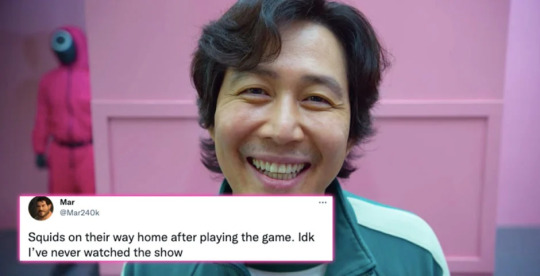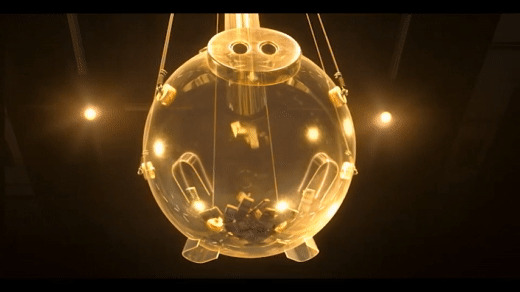Text
Who can be the winner in a game full of disadvantages? (CONTAINS SPOILERS!)

Who can be a winner in a game full of hidden disadvantages? Netflix’s hit show, Squid Game, hones in on some ideas related to this question while mirroring problems with unfairness in our own reality. We are introduced to the main character, Gi-hun, and are left disappointed multiple times by his actions. Gi-hun gambles whatever money he can scavenge, sometimes even taking from his own mother. What kind of son is that?
Gi-hun bets on horses and plans to use this money for his daughter’s birthday gift. To his dismay, the loan sharks he owes money to catch up with him and threaten him for repayment. Instead, he settles on getting his daughter a claw machine prize… My first impressions of Gi-hun were that he’s very irresponsible and not someone I would be proud to call my son. I was frustrated watching him gamble his (and his mother’s!!!) rent money over and over like it was some game. We start to realize that Gi-hun is merely relying on hope and luck to change his fate, and many people would be inclined to make the same choices. When life becomes so miserable and almost unlivable, it is understandable why a person would push their luck, hoping for a miracle. One day, Gi-hun is approached by a mysterious man, a recruiter for Squid Game. He asks Gi-hun if he would like to play ddakji — “a traditional South Korean game played using folded paper tiles” — for money. If the recruiter wins, he gets to slap Gi-hun; if Gi-hun wins, he gets the money. Gi-hun is slapped several times before winning the money. This is all a test to see who is desperate enough to win the smaller prize of money so they can be persuaded to play an even bigger game with higher stakes.

Some of the other significant characters also have their backstories explained. Sang-Woo, aka player 218 and Gi-hun’s childhood friend, is known for graduating from a prestigious university. However, what everyone else doesn’t know is that he is in unimaginable debt and running from the police for investing his clients’ money in the stock market. Sae-Byeok, player 067, is a North Korean defector who spends her days pit-pocketing, trying to gather enough money to get the rest of her family out of North Korea. Ali, player 199, is a Pakistani immigrant who is trying to provide a future for his wife, child, and family back home. He struggles due to his irresponsible and unsympathetic boss who is unwilling to give Ali his compensation for a factory accident. All of these characters have something in common: desperation to acquire money without a dependable source to actually get it. We are thrown into their lives and can understand why simply “getting a job” or “working more/harder” is not a quick and easy solution for the characters. The recruiter gives each player a card with a number to call. If they decide to join the games, they are taken far away to an island off the coast of Seoul. With this context given, we can start to dive into the secret messages regarding capitalism which are prevalent throughout Squid Game.
Individuality + Factory Jobs
In the first episode, we see a distinct division between two groups: guards and players. The guards wear pink hazmat suits and a mask, marked with one of three possible shapes (circle, triangle, or square). They are confined to small rooms, with only a bed, toilet, and sink. A note posted beside the mirror reminds the guards of three important rules they must follow. The guards may not (1) remove their masks outside the room, (2) converse with other guards (without permission), and (3) leave their rooms without permission. They are called and dismissed with a buzzer, watched closely with cameras, and must follow strict orders or they may face punishment. The main purpose the circle masks serve is to carry out mundane (and sometimes risky) jobs, then return to their rooms. Sounds familiar, doesn’t it?

On the other hand, the players are stripped of their individuality in a similar way. Instead of hazmat suits, the contestants sport green tracksuits which are labeled with their individual numbers. The players are identified by their number, and all of their information is stored in a database. This too sounds familiar... doesn’t it?! I have only had one real corporate job in my life as a barista at Starbucks and thinking back on it now, I realize how my own job at the staple coffee shop could be put in comparison to some aspects of Squid Game. Each worker at Starbucks has a unique number to identify them, we all wear the same apron with a dull dress code, and we must submit information to the company before we are considered for the job. This is how most big corporations are run since capitalism has a high prioritization on profit. Keeping things consistent and repetitive allows for efficiency and higher production, so individuality is often seen as something that should be avoided. It is a way to keep away from mistakes.
Hierarchy, Roles of Players + Guards
Deception and Betrayal
The hierarchy in Squid Game from bottom to top is as follows: players, circle guards, triangle guards, square guards, the Front Man, and the VIPS (the super-rich weird dudes). The players themselves have somewhat of a hierarchy going on since some players have advantages over others. Byeong-gi was a doctor, prior to joining the competition. He made some connections with the guards and helped them dissect the losing players’ corpses to sell their organs on the black market (so gruesome). Deok-su is a buff and menacing gang member who is always trying to intimidate the other plays to let them know who’s boss. When the tug-of-war game is presented, Deok-su chooses only the strongest-looking men for his team. Remember how I mentioned Byeong-gi’s connection? He is handed secret notes inside his food, hinting about what games are coming next so he can prepare for them. When he tells Deok-su this, he wins himself a spot on the team, providing brains to the brawns. Deok-su also betrays his alliance with Mi-nyeo (even though he promised they would stay together) simply because she’s a woman and he doesn’t think she’ll benefit the team. Gross misogyny... I really hated that guy. Anyway!! Mi-nyeo ends up joining the main character, Gi-hun, and his team.

Gi-hun’s team faces another group in a fight-to-the-death game of tug-of-war. At first glance, Gi-hun’s team does not look too promising. Il-nam, the oldest player in the game, does not appear to be a very desirable teammate to have for tug-of-war… Although the physical strength of Gi-hun’s team does not compare to their opposers, their quick thinking is what ultimately saves them in the end. Sang-woo comes up with an idea. He tells his teammates to let go of their grip on the rope so the other team jerks backward. Once they lose control and start to stumble, Gi-hun’s team can pull back, dragging their opposers off the ledge in victory.
Throughout the games they play, there always seems to be somewhat of a disadvantage for some of the players. One skill may be valued more than another, or choices the players make can greatly determine their fate. The Front Man tries to equate “randomness” with fairness, but the games are actually the furthest thing from fair. Over and over, players betray and deceive each other in order to survive. Everyone tries to figure out how to obtain advantages so they can survive and win the grand prize money.
We’re about to get emotional now... And this is a major spoiler. This scene had me crying violently. Bottom lip quivering and everything. If you’ve watched Squid Game, I’m pretty sure you remember Ali. The whole scene with the marble game... Yeah. That was rough. Ali was known for his kindness, but this positive trait ended up getting him killed. Ali trusted Sang-woo and believed they were starting a friendship. The two were pitted against each other for a deathly game of marbles. Ali is heartbroken, realizing that either he or his new friend will be sacrificed to the game. Sang-woo doesn’t seem to have the same sympathy though. He betrays Ali, stealing his marbles and replacing them with rocks while Ali is not looking. The two split up and this is when Ali realizes that he has been betrayed and literally lost all of his marbles, losing the game. I think I was just as shocked as Ali during this scene...

Squid Game mirrors capitalism in the way that workers are sometimes persuaded to betray and compete against their fellow coworkers for positions, raises, and bonuses. If people are desperate enough to emerge on top, who knows what they will do to get there? Capitalism also supports an “every-man-for-himself” mindset, which is seen in the marble scene between Ali and Sang-woo. In Squid Game, Ali’s selflessness is punished and exploited. Capitalism often sends the message that anyone can be successful with hard work, but in reality, this is not true. If you are too kind to others, you will be taken advantage of. In order to truly be “successful” (aka make money and live more comfortably), you have to betray some of your morals and be selfless. On top of that, is it really even possible for everyone to end up successful in a capitalist society? The short answer is no.
Keeping Hierarchy in Place
I mentioned before that the Front Man of the games tries justifying them using randomness as a fair tactic. I’ll say it again. In the games, there are clear disadvantages for certain groups of players. You would think this would persuade the contestants to leave the game... At the beginning of the show, the players hold a vote to end the game. The score for yes and no were at a 50/50 vote until the guards brought this glamourous yellow biggy bank down from the ceiling.

Once the players saw the physical cash drop into the bank, a lot of them had changed their minds about putting an end to the game. Using “propaganda” like this to manipulate the players into roughing it out through harsh conditions is also a common practice in a capitalist society. Capitalism motivates people to endure terrible conditions for the promise of possible financial stability. Amazon, one of the biggest companies in the world is known for having undesirable working conditions for its employees. Amazon taped posters in bathroom stalls and all-around their warehouses, attempting to persuade their workers not to unionize.
Opposition
questioning the game itself
amount of money the spectators have could help the people who are in need
Squid Games are completely unnecessary and pointless
is seeing everyone (including those you are about) die around you for money worth it?
struggling with life after winning Squid Games
the main character is an example of this
doesn’t even want to spend his prize money
completely changed from the beginning
used to gamble his own mother’s money, now he has all this money and it has no value to him bc of what it took to get it
Gi-hun keeps his humanity, refuses to accept that anyone is disposable, ironically this authentic human element he retains make him the best player

sources:
How Amazon Crushes Unions
How Squid Game Critiques Capitalism (spoilers)
Netflix: Squid Game
Squid Game Cast & Character Guide
Squid Game’s Real Message about Capitalism, Explained
The Guards of Squid Game Explained | Squid Game Explained
12 notes
·
View notes